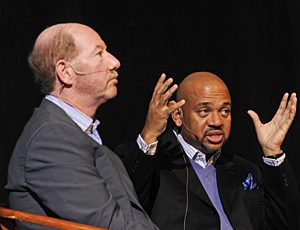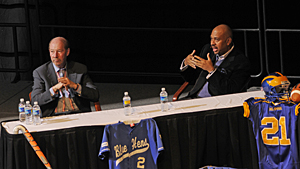
- Rozovsky wins prestigious NSF Early Career Award
- UD students meet alumni, experience 'closing bell' at NYSE
- Newark Police seek assistance in identifying suspects in robbery
- Rivlin says bipartisan budget action, stronger budget rules key to reversing debt
- Stink bugs shouldn't pose problem until late summer
- Gao to honor Placido Domingo in Washington performance
- Adopt-A-Highway project keeps Lewes road clean
- WVUD's Radiothon fundraiser runs April 1-10
- W.D. Snodgrass Symposium to honor Pulitzer winner
- New guide helps cancer patients manage symptoms
- UD in the News, March 25, 2011
- For the Record, March 25, 2011
- Public opinion expert discusses world views of U.S. in Global Agenda series
- Congressional delegation, dean laud Center for Community Research and Service program
- Center for Political Communication sets symposium on politics, entertainment
- Students work to raise funds, awareness of domestic violence
- Equestrian team wins regional championship in Western riding
- Markell, Harker stress importance of agriculture to Delaware's economy
- Carol A. Ammon MBA Case Competition winners announced
- Prof presents blood-clotting studies at Gordon Research Conference
- Sexual Assault Awareness Month events, programs announced
- Stay connected with Sea Grant, CEOE e-newsletter
- A message to UD regarding the tragedy in Japan
- More News >>
- March 31-May 14: REP stages Neil Simon's 'The Good Doctor'
- April 2: Newark plans annual 'wine and dine'
- April 5: Expert perspective on U.S. health care
- April 5: Comedian Ace Guillen to visit Scrounge
- April 6, May 4: School of Nursing sponsors research lecture series
- April 6-May 4: Confucius Institute presents Chinese Film Series on Wednesdays
- April 6: IPCC's Pachauri to discuss sustainable development in DENIN Dialogue Series
- April 7: 'WVUDstock' radiothon concert announced
- April 8: English Language Institute presents 'Arts in Translation'
- April 9: Green and Healthy Living Expo planned at The Bob
- April 9: Center for Political Communication to host Onion editor
- April 10: Alumni Easter Egg-stravaganza planned
- April 11: CDS session to focus on visual assistive technologies
- April 12: T.J. Stiles to speak at UDLA annual dinner
- April 15, 16: Annual UD push lawnmower tune-up scheduled
- April 15, 16: Master Players series presents iMusic 4, China Magpie
- April 15, 16: Delaware Symphony, UD chorus to perform Mahler work
- April 18: Former NFL Coach Bill Cowher featured in UD Speaks
- April 21-24: Sesame Street Live brings Elmo and friends to The Bob
- April 30: Save the date for Ag Day 2011 at UD
- April 30: Symposium to consider 'Frontiers at the Chemistry-Biology Interface'
- April 30-May 1: Relay for Life set at Delaware Field House
- May 4: Delaware Membrane Protein Symposium announced
- May 5: Northwestern University's Leon Keer to deliver Kerr lecture
- May 7: Women's volleyball team to host second annual Spring Fling
- Through May 3: SPPA announces speakers for 10th annual lecture series
- Through May 4: Global Agenda sees U.S. through others' eyes; World Bank president to speak
- Through May 4: 'Research on Race, Ethnicity, Culture' topic of series
- Through May 9: Black American Studies announces lecture series
- Through May 11: 'Challenges in Jewish Culture' lecture series announced
- Through May 11: Area Studies research featured in speaker series
- Through June 5: 'Andy Warhol: Behind the Camera' on view in Old College Gallery
- Through July 15: 'Bodyscapes' on view at Mechanical Hall Gallery
- More What's Happening >>
- UD calendar >>
- Middle States evaluation team on campus April 5
- Phipps named HR Liaison of the Quarter
- Senior wins iPad for participating in assessment study
- April 19: Procurement Services schedules information sessions
- UD Bookstore announces spring break hours
- HealthyU Wellness Program encourages employees to 'Step into Spring'
- April 8-29: Faculty roundtable series considers student engagement
- GRE is changing; learn more at April 15 info session
- April 30: UD Evening with Blue Rocks set for employees
- Morris Library to be open 24/7 during final exams
- More Campus FYI >>
8:17 a.m., March 24, 2009----Tony Kornheiser and Michael Wilbon from ESPN's Pardon the Interruption came to the University of Delaware's Bob Carpenter Center on Friday, March 20, to talk about life as sportswriters and also about sports issues in the Delaware area.
The two met 30 years ago, when Wilbon was a summer intern at the Washington Post and Kornheiser was a sportswriter with the newspaper. They have worked together ever since, both at the Post and on television.
“On ESPN, they put people together and say 'go' and it doesn't often work,” Kornheiser said. “One of the reasons this works is because we've known each other for 30 years, we've been friends an awfully long time. When we started doing PTI and the television sets would be on in the Washington Post newsroom, nobody even looked up because they were so used to us doing this, yelling and screaming at each other and making fun of one another for years and years and years, that they just assumed we were still in the building.”
The two veterans of the journalism industry explained why people want to be sportswriters.
“All sportswriters are failed athletes,” Kornheiser said. “All of them can't play as well as they'd like to play and they love sports and they want to stay with sports and so they say 'How do I do it? I become a sportswriter.'”
“If we had been any good being athletes, we'd have been athletes,” Wilbon said.
“We'd be getting paid for being athletes, not writing about them,” Kornheiser added.
When asked why Delaware has no major professional sports teams, Kornheiser said it because it is such a small state. But as a result of having no professional sports teams, he pointed out that Delaware would be able to enact sports betting, as the professional leagues won't be able to shut down gambling operations because they do not have teams in the state.
“It's going to be the trend of the future,” he said. “A lot of states within the next five or six years, when it works in Delaware, are going to do the same thing.”
Kornheiser, as a Southern Delaware homeowner, has noticed that the area is unique. Because the state has no professional sports teams of its own, he sees a mixture of sports logos of teams from Philadelphia, Baltimore, and Washington, D.C., wherever he goes.
“I don't know if there are other areas like that, like Southern Delaware, that have the spheres of influences of all of these major cities around them,” he said.
Wilbon explained to the crowd at The Bob about teams and athletes sportswriters decide to cheer for and why.
“This is something you should learn about people in the sports industry, in whatever capacity they work,” he said. “We like people that we like. We root for people we like because we actually know them.”
He also said there is a difference between being a fan and being a sportswriter.
“You don't root for teams you cover,” he said. “[As Washington, D.C. sportswriters] we comment on the Washington Redskins. We don't root for them, we don't root against them. We don't really much care.”
Current sports issues up for discussion at the event included the success of Baltimore Ravens and former Delaware quarterback Joe Flacco, the chances of the Philadelphia Phillies repeating as World Series champions, and the NCAA Division I men's basketball tournament.
“What Flacco did was fabulous, given all the things that were supposed to weigh him down and hurt him, including a rookie coach and no offense,” Kornheiser said. “He was great.”
“If you're a Philadelphian and you grew up a Phillies fan, you should feel great. Your team just won the World Series,” Wilbon said. “Enjoy the fact that your team won. Repeating is so hard.”
Regarding NCAA basketball, Wilbon said, “What made the tournament great are two things: UCLA and all that UCLA did to make people notice, like the Yankees and the Celtics and Notre Dame. They made you notice that you could hate them or admire them, but that's why you watched. The second part to that component is upsets. The tournament got to be great because of these incredible buzzer-beating performances and upsets.”
With the changes in the newspaper industry, Wilbon said the core of journalism, being able to tell the story, will still exist and it is just a matter of how the story is told that may change.
“Our industry, the way we knew it, has collapsed,” Wilbon said. “Having said that, the art of storytelling is not going to go away. The point is, how do you tell those stories and how do you equip students to tell these stories? I hold out some hope that storytelling is as important and as attractive a profession as it has ever been. We're just in a major upheaval in terms of how you get that story out.”
The event was presented by the Student Centers Programming Advisory Board (SCPAB).
Caseyboy, from radio station WMMR-FM, moderated the discussion.
Article by Jon Bleiweis
Photos by Duane Perry



